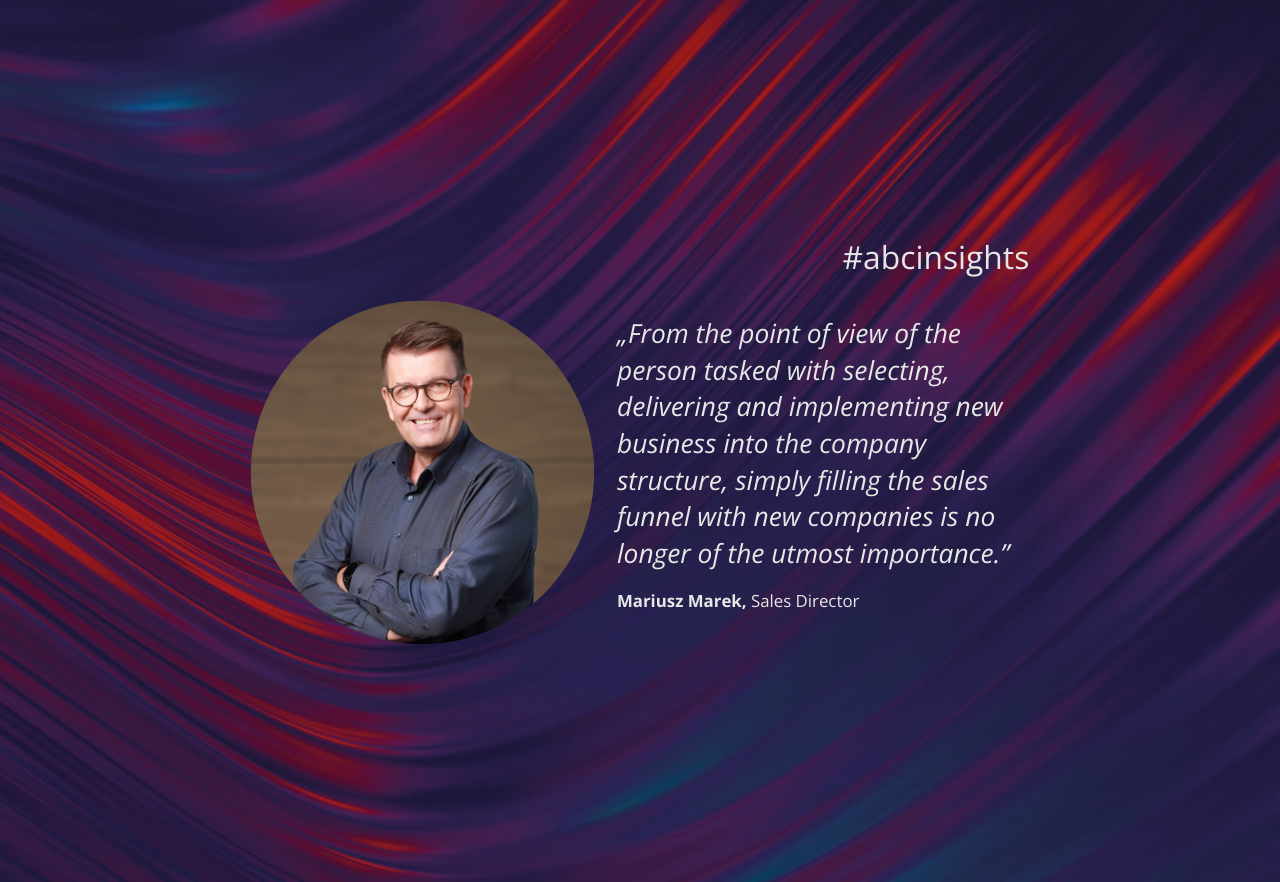The past few years have brought a number of challenges for the TSL industry. The COVID-19 pandemic, the war in Ukraine and the revolution in the job market have forced companies to adapt their strategies to a new reality. In the face of these challenges, effective sales in the TSL industry require not only an understanding of the market, but also flexibility and innovation. How have sales and related innovations in the TSL industry changed in recent years?
From the perspective of an experienced sales professional
This year marks 10 years since I started working with ABC Czepczyński. I think it’s quite a significant time in life (not just for me), but also an increasingly rare situation of continuity in professional cooperation, at least in Poland.
If you look at my photo, you will guess that ABC is not my only professional experience. I can boast 25 years of work in various companies, including several years running my own business. However, one thing unites these stages – sales. Every time, one way or another, I’ve been involved in direct sales or sales network management, or in my case a network that I built myself. – Enough self-promotion.
Sometimes I feel like not everyone understands what I do. Sales, in the eyes of others, seems like a simple process involving excessive talking, with a clearly defined end. Any attempt I make to correct such a point of view usually ends up wide-eyed and dispels the notion of a travelling salesman from the 1960s knocking on doors and offering cookbooks or other inventions that could only be sold that way back then. Of course, such an incident has also occurred in my career. However, it was intentional and led to a specific goal.
Challenges in the TSL industry and customer expectations
Recent years have been extremely difficult for sales processes. The pandemic, the war situation and a lack of drivers, combined with a revolution in the labour market, have significantly changed the transport industry and even turning it upside down. All of this has led to an acceleration in the search for solutions related to improving process efficiency, shortening operational times, and outsourcing services in the logistics industry. And this is also what customers expect from us.
However, let’s go back to how we sell. From the point of view of the person tasked with selecting, delivering and implementing new business into the company structure, simply filling the sales funnel with new companies is no longer of the utmost importance. There are many variables that determine the choice of a company to collaborate with, depending on the credibility of the future counterparty, their position in the supply chain, and the susceptibility to integrating the process into existing ones in our company.
I think it is clear to everyone that approaching the issue in this manner does not make the salesperson’s job any easier in selling the rather uninspired services of the road transport organisation. Often, it takes several months or even years from the initial contact to the first transaction. Sometimes we are to blame for such a long period, and often the potential partners we choose are not interested in cooperation at that moment. It is difficult to identify the moment and the reason for this situation to change. Changes in how we are perceived as bidders occur gradually getting to know not only our offer but also the character of our company as a future service or product provider. Participation in many industry conferences in Poland and beyond has allowed us to gather a lot of information about the expectations of our current and future customers. One of the expectations is the certainty that we will understand each other comprehensively. Organizational agreement, reflecting management processes, builds trust with partners and encourages conversation. After such verification, even if you end up in the waiting queue, you know it is the right queue.
What determines success in sales?
And here we come to the differences between the aforementioned travelling salesman, whose success depended solely on him, and the situation where the whole company is responsible for sales. During the initial conversations, it’s quite difficult for future partners to assess whether the structure, management style and values of the potential partner match mutual expectations. Strategic plans and development visions should also be added, which will show how well we fit into the surrounding reality and the changing technological environment. Technology has recently been a leading factor in company development. We all want to digitalize, creating platforms for exchanging information. Each company is like a huge digital disk full of terabytes describing its processes. All this is done to effectively and efficiently exchange necessary information. This area is also an important sales argument.
There is one more element that distinguishes current sales processes from those of the 60s. It’s the attention our interlocutors pay to the social aspects of running a business. Social engagement and empathy are non-financial values that define us as business partners. Currently, this is probably the area for the greatest creativity for boards or CSR departments. In this respect, we are all motivated by the European Commission Directive on Sustainable Development Reporting. By presenting our actions in this area, we often open the door to cooperation or set a good example of how to combine business activities with pro-social activities.
Sales strategies in different European markets
Everything I described earlier is useful in sales, and in improving sales competence. However, when it comes to selling in Amsterdam, we should consider the high competitiveness of that market and demonstrate the maximum complexity of our business, while also showing as much interest in money as possible. England, on the other hand, teaches patience; when selling in Germany or Austria, remember to use key words like ‘Kundenorientierte’ or ‘Zielorientierte’. In countries referred to as CEE, adding a bit of friendliness is enough to be well understood. Poland is a kind of sales minefield, you only make one mistake.
It is now clear how complicated it all is and that sales is not a linear process. This was very correctly defined by US-based sales preachers who, during training, divided the sales process into six stages and its diagram looks like the one below:

What else is unclear to you here 😊???

Mariusz Marek, Sales Director at ABC Czepczyński
Experienced sales manager in an international environment, with an excellent understanding of the specific needs and requirements of corporate clients. Associated with ABC Czepczyński since 2014.
